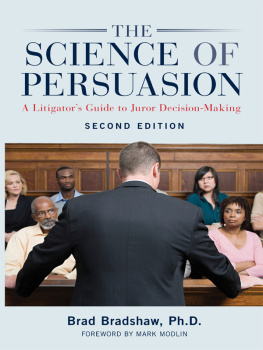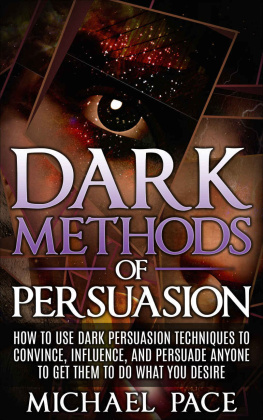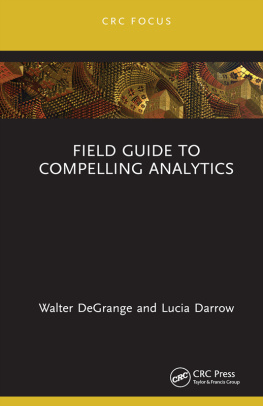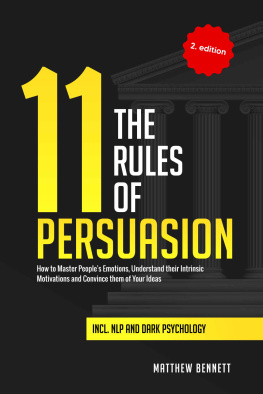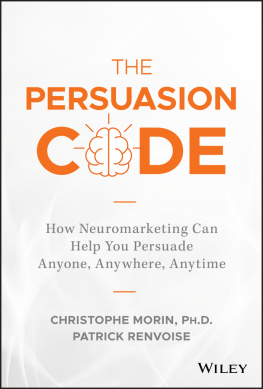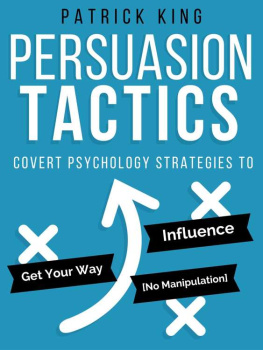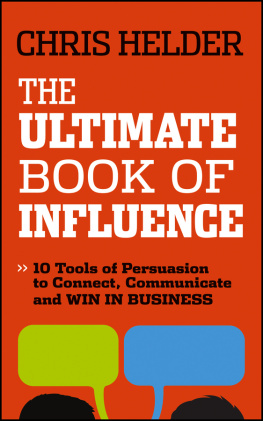THE SCIENCE OF PERSUASION
A Litigators Guide to Juror Decision-Making
SECOND EDITION
Brad Bradshaw, Ph.D.
FOREWORD BY MARK MODLIN

Cover design by Elmarie Jara/ABA Publishing.
The materials contained herein represent the opinions of the authors and/or the editors, and should not be construed to be the views or opinions of the law firms or companies with whom such persons are in partnership with, associated with, or employed by, nor of the American Bar Association or the Criminal Justice Section unless adopted pursuant to the bylaws of the Association.
Nothing contained in this book is to be considered as the rendering of legal advice for specific cases, and readers are responsible for obtaining such advice from their own legal counsel. This book is intended for educational and informational purposes only.
2014 American Bar Association. All rights reserved.
No part of this publication may be reproduced, stored in a retrieval system, or transmitted in any form or by any means, electronic, mechanical, photocopying, recording, or otherwise, without the prior written permission of the publisher. For permission contact the ABA Copyrights & Contracts Department, .
Library of Congress Cataloging-in-Publication Data
Bradshaw, Brad, author.
The science of persuasion: a litigators guide to juror decision-making / Brad Bradshaw. -- Second edition.
pages cm
Includes bibliographical references and index.
e-ISBN: 978-1-62722-536-6
1. Jury--United States--Decision making. 2. Trial practice--United States--Psychological aspects. 3. Forensic oratory--Psychological aspects. 4. Persuasion (Psychology) I. Title.
KF8972.B73 2014
347.73'752--dc23
2014008459
Discounts are available for books ordered in bulk. Special consideration is given to state bars, CLE programs, and other bar-related organizations. Inquire at Book Publishing, ABA Publishing, American Bar Association, 321 N. Clark Street, Chicago, Illinois 60654-7598.
www.ShopABA.org
This book is dedicated to the family of Sarah Johnson.
Her sudden absence is proof that life isnt fair.
We all love and miss her.
Contents
ACKNOWLEDGMENTS
I am one of the many who have benefited from the knowledge of the following people: David Ball, Beth Bonora, Ken Broda-Bahm, Robert Cialdini, Paul Ekman, Marjorie Fargo, Jeff Frederick, Richard Gabriel, Bill Grimes, Julie Howe, David Illig, David Island, Daniel Kahneman, George Kich, Susan Macpherson, Ron Matlon, Thomas Mauet, Jim McElhaney, Pat McEvoy, Robert McKee, Matt Milano, Phillip Miller, Shane Read, Andy Sheldon, Amy Singer, Amos Tversky, Donald Vinson, Richard Waites, and Dan Wolfe. They are the upper echelon at the intersection of law and human behavior, and I hope to someday be included on a list of that caliber.
Deserving individual praise are Mark Modlin and Becky Jones of the famed Modlin & Jones Mediation and Trial Consulting. I will be forever indebted for your contributions to this book, and my career.
Continued extra special thanks to my editor, Erin Nevius, and the others at the American Bar Association who saw the potential in this book and guided me down the unfamiliar path. The ABA is, without question, a top-notch organization. Any remaining imperfections in this book rest squarely on the shoulders of the author.
To my academic mentors, Jonathan Golding and David Ross, your wisdom and advice has had a lasting effect. I think of you more often than my correspondence reflects.
To my friends and colleagues: David Acevedo, Ben Fulwider, Joe Guthrie, Kathy Hytten, Aimee Mark, Andrea Reed, Paul Rosen, Doug Samuel, Anthony & Jill Shelton, Dustin Stairs, and David Waldeck. Personally and professionally, I have learned something from each of you. Therefore, a part of each of you is in this book.
Finally, my greatest thanks go to three very special people: My big brother, Jim Bradshaw, whom I still just want to follow around wherever he goes. My father, the original Brad Bradshaw, whose love for books inspired me to write this one. And my mother, Lill Heit, whose affection for me is proven by her willingness to read anything I write. Mom, your name deserves to be on the cover.
FOREWORD
With nearly three decades of trial consulting experience in my rearview mirror, I can say unequivocally that persuasion is a fundamental skill not just for litigators but also for anyone who wants to make things happen. Change agents. Business leaders. Community activists. Entrepreneurs. Those who are successful at what they do all have one thing in commonthey have mastered the ability to persuade others to see, understand, appreciate, and ultimately support their cause.
Brad Bradshaw understands this and has developed an excellent resource that helps us hone our persuasive skills. This new edition of The Science of Persuasion is a gold mine of information that teaches new studentsand reminds the most seasoned litigatorsthat persuasion is not something to be saved for a closing argument. It is a process of influence that must be applied from the beginning of a case until its conclusion. Jurors begin to assess attorneys the moment they enter a courtroom, and they continue making judgments about them, their witnesses, and the evidence throughout the trial. Even though judges instruct juries to not decide a case until all the evidence has been presented, jurors cannot help but make little decisions along the way. They see; they hear; they respond. Therefore, they can be persuaded at each juncture. This book shows how.
Those who have had the opportunity to work with Dr. Bradshaw are familiar with his uncanny ability to cut through the clutter, discard the unnecessary, and present the evidence in its most compelling form. This book provides a glimpse behind the curtain of that process. The strength of this book is the same as his strength as a consultant: the ability to simplify complex issues, making them interesting and enjoyable.
Dr. Bradshaws unique ability to teach others is born of his passion for studying human behavior, coupled with his understanding of the legal process. He is, above all things, a talented translatorone who interprets and explains how each step in the trial experience is an opportunity for the litigator to persuade the audience. It is an honor to provide the foreword for this edition because I am proud of his work and feel fortunate to know such a conscientious, hard-working, perceptive individual. He is a credit to the trial consulting profession.
The Science of Persuasion is an invaluable resource that will benefit a wide range of litigators. Law schools will improve their students education by adapting it into their coursework. Young, practicing attorneys can learn what may have been overlooked in their training. Even skillful litigators will appreciate the updated fact patterns and fresh insights that Dr. Bradshaw provides.
The Science of Persuasion is a book that will add value to your practice for years to come because it wont stay on your shelf: youll use it over and over!
Mark A. Modlin, M.S., N.C.C.
Modlin & Jones Mediation and Trial Consulting
PREFACE
This book was written for law students, experienced litigators, and everyone in between. While this book will be a useful guide to anyone interested in litigation, it is written with the assumption that the reader has a basic understanding of the legal process and key terminology. For example, I address issues regarding peremptory challenges and challenges for cause without ever giving a specific definition of either. Most readers of this book will know the difference, and I do not want to water it down with information that most readers will know. It is my hope that every page of this book will contain useful information for even the most experienced litigators, while being user friendly to those new to the profession.

